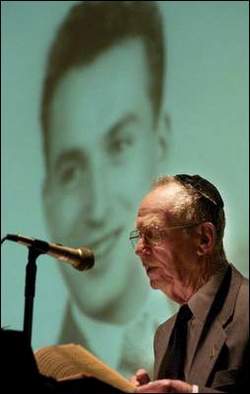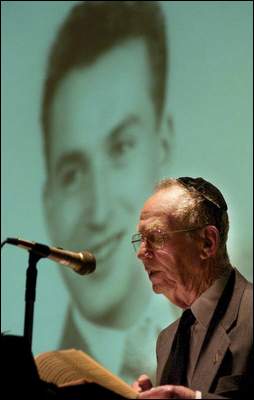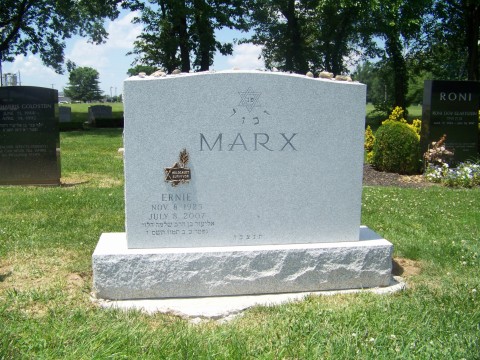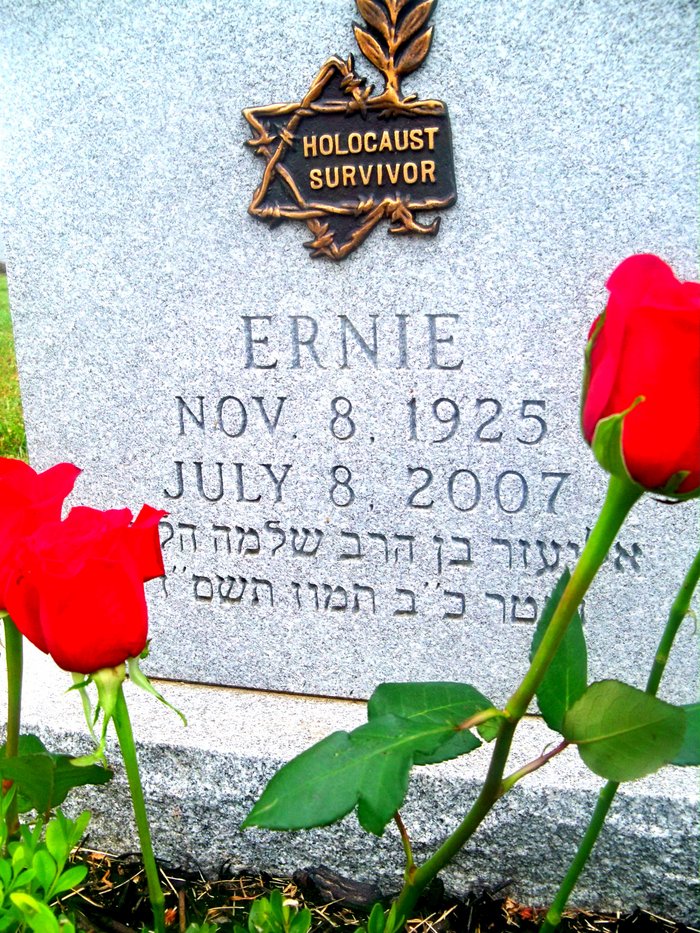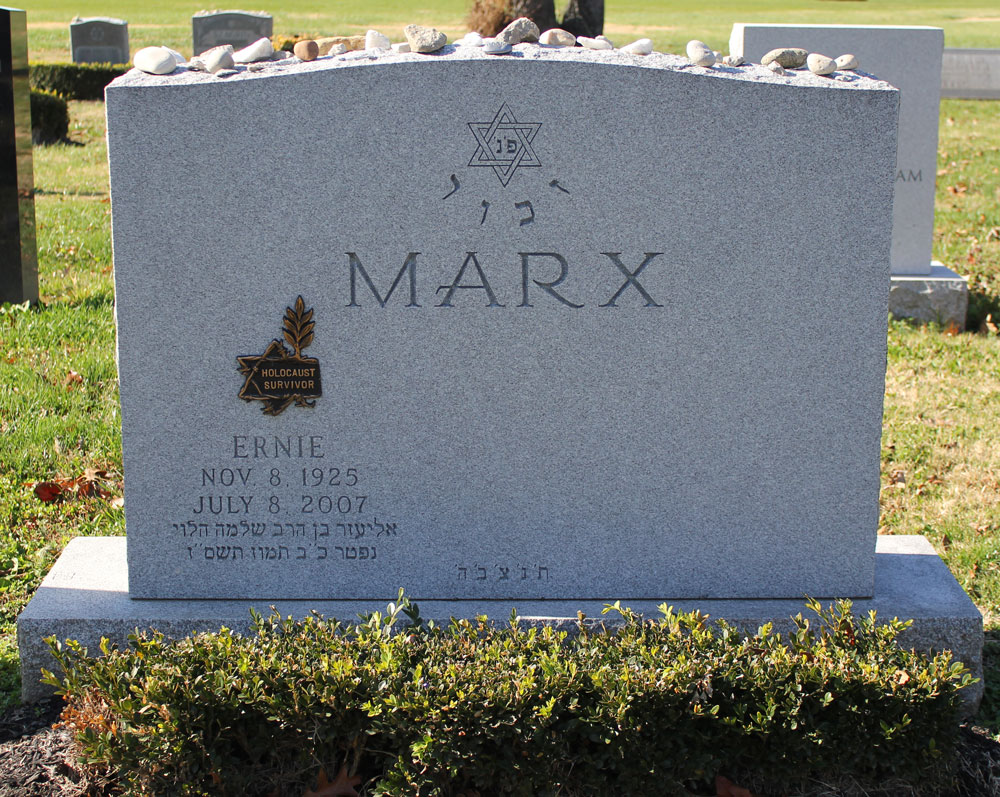He was the former ritual director at Congregation Adath Jeshurun.
He was a member of Congregation Adath Jeshurun, the Community Relations Council and the Jewish Community Center. He was a professional volunteer for numerous organizations, a few of which are: Four Courts Senior Center, Jewish Hospital and the Chevra Kaddisha. Ernie won several awards over his lifetime, including, in 2005, the FBI Louisville Division Director's Community Leadership Award, St. Francis of Assisi Class of 2005 Tikkum Olam Award, where he was also an honorary graduate, and he received the Fort Knox Days of Remembrance Awards from 2000 – 2006.
He was the loving and adoring husband of his wife, Thelma, who survives. Ernie is also survived by his daughter, Sharon Davis; son, Adam Marx; daughter, Judith Bradley (Dan); son, David Hammer (Susan) of St. Paul, MN; grandchildren, Marah, Zachary and Julie Davis, Rachel and Jacob Bradley and Andrew Hammer; and beloved friend, Ilse Meyer.
Funeral services will be held at 2 p.m. Tuesday, July 10, 2007, at the funeral home, with burial in Adath Jeshurun Cemetery, 2926 Preston Highway. Visitation will begin after 1 p.m. Tuesday.
Expressions of sympathy may be given to the U.S. Holocaust Memorial Museum, Member and Donor Services, P.O. Box 90988, Washington, DC 20090–0988, or to Rabbi Robert B. Slosberg Minyan Fund, 2401 Woodbourne Avenue, Louisville, Kentucky 40205.
Ernie Marx, a face of the Holocaust for many, dies
Survivor shared tragic story often
By Paula Burba
The Courier-Journal
I do carry a heavy burden -- the burden of remembering. And a painful duty, the duty of passing on those memories so that the world will learn that it should never happen again."
The heavy burden Ernie Marx spoke of in 1992 was having to relive -- hundreds of times -- the events he witnessed as a child and teenager in his native Germany and later in France during the Holocaust.
Marx died Sunday of cancer at Norton Healthcare Pavilion at the age of 81 -- after spending his final 25 years, telling and retelling his story, hoping it would persuade people to reject hatred and champion tolerance.
"Last week he said to me, 'Will I leave a legacy?' " said his friend Ilse Meyer, also a Holocaust survivor.
"And I said, 'Why would you even ask me that?' " Meyer recalled. "You leave more of a legacy than anyone else that I know. You've educated people. You've never held back … from making sure that it doesn't happen again."
Meyer said she met Marx when she came to Louisville 20 years ago, at Adath Jeshurun Synagogue where he worked as ritual director from 1982 to 1998.
"He had a knack of teaching very complicated historical events and ideas in a very engaging and sensible way," said Rabbi Robert B. Slosberg. "Probably, had he been born at a different time in Jewish history, he might have been a rabbi."
Marx's father was a rabbi at a synagogue near Frankfurt, Germany, that was burned down on Nov. 9, 1938. That was Kristallnacht, or the "night of broken glass," regarded as the beginning of the Holocaust, in which 6 million Jews and others were killed under the Nazi regime.
Marx had turned 13 the day before and was a week from his bar mitzvah when his family was uprooted.
Eventually, his father would be killed at a concentration camp in Auschwitz. Marx was separated from his mother and brother for several years, some of the time in France.
He came to the United States at 22, and since 1982 had spoken to hundreds of Louisville schoolchildren and other groups, hoping his painful personal history would help prevent such an event from happening again.
"He went to church groups, to school groups, he did tolerance education for the FBI," said St. Francis of Assisi School teacher Fred Whittaker, who recalls Marx telling him that once "I was like everyone else, I wanted just to forget."
"One day someone asked him to come speak in their classroom," said Whittaker, whose eighth-graders at St. Francis of Assisi studied the Holocaust with Marx each year. "And he realized that he needed to tell the story."
After that, Slosberg said, "For many people, he became the face of the Holocaust."
Marx took at least 77 groups -- usually of 40 to 50 students each -- to the U.S. Holocaust Memorial Museum in Washington, where he was an honorary tour guide. He would translate German inscriptions and read Scripture and poetry to students in the museum's prayer garden, his friends said yesterday.
"I don't think you're ever prepared for what you see when you arrive there," said Trinity High School principal Dan Zoeller, who traveled with Marx and a group of students to the museum. "That's why Ernie going on those trips was so important for the kids, because they had a connection, an immediate connection. They weren't just photographs."
"I know a lot of kids are gonna grow up with larger hearts and more open minds thanks to Ernie Marx," Zoeller said.
"This is how conscientious he was," said Meyer, whose sister and parents died in the Holocaust. "He'd go to two or three places a week, tired, worn out. When you talk about things like that, it eats your heart out and you relive it."
In 2002, Marx was chosen among Louisville participants in a relay as the U.S. Olympic torch made its way to the Winter Olympics in Salt Lake City.
Daughter Judith Bradley said that moment characterized her father's life, "because he ran his lap, he didn't walk it, he ran it. And that's the image -- at 76, here he is, he's running.
"The torch for him was really, truly about carrying this passion for … this idea ... we can dislike others, but hate is just a horrific place to be."
St. Francis of Assisi awarded Marx an honorary diploma in 2005. "After that," Whittaker said, "he'd say, 'I'm the only Jewish Cougar,' " referring to the mascot of the Catholic grade school.
Meyer said she believes Marx's sense of humor is one of the things that helped him survive the Holocaust -- without it, she said, "you die."
Added Whittaker: "I guess a measure of your life is in the end how many people feel they know you. There are so many individuals who met him only one time. Maybe it was only one time to go on a trip to the Holocaust memorial, and yet they feel like they've known him all of their lives. They're his family."
Ernest Marx is the son of Siegmund and Bertha (Steinberger) Marx. He was born in 1925 in Gelnhausen, Germany (near Hanau). In 1927 his family moved to Rothenberg, and in 1933 moved again to Speyer, where his father worked as a religious teacher and cantor before receiving his rabbinical ordination in 1936. Ernest had one older brother, Julius (b. 1922). On November 9, 1938 during the Kristallnacht pogrom, Ernest's father was arrested and told to bring along one son. It was quickly decided that Ernest would accompany Siegmund, while Julius would stay behind to take care of Bertha. Ernest and his father were sent to Dachau for six weeks, during which time Ernest celebrated his bar mitzvah. Shortly after their release Julius was sent to Switzerland and Ernest, to France on a Kindertransport. Both parents accompanied Ernest's transport as chaperones. Once in France, Ernest was enrolled at the Ecole Maimonides near Paris, where he remained until the French defeat in June 1940. At that time he was put under the protection of the OSE (Oeuvre de secours aux enfants) and sent to the Eaubonne children's home outside Paris. A few months later he was transferred to the Montintin home, where he remained until 1942. Sometime in or around 1939 the Marx family received American immigration visas, but they were never able to use them to leave Europe. Ernest's father was arrested in September 1939 as a German enemy alien and sent to Saint Germain. The following summer after the fall of France, he was rearrested as a foreign-born Jew and imprisoned in the Les Milles internment camp. In 1942 he was transferred to Drancy and from there, was deported to his death in Auschwitz. Ernest's mother eluded arrest and in 1942 was living in hiding in Limoges. Ernest joined her there in 1942, but shortly after their reunion both were arrested separately and sent to the Gurs internment camp, where they were unaware of each other's presence. Ernest managed to escape from the camp with four friends. The opportunity to flee came about suddenly during a game of soccer when their ball was inadvertently kicked over the camp fence. They climbed over the fence to retrieve the ball but never returned. Ernest subsequently joined up with the Chasseur Alpin, a unit of the French Maquis resistance. Ernest's mother remained in Gurs and was slated for transfer to Drancy when she suffered a stroke and was left for dead. Miraculously, she recovered and survived the rest of the war. After the liberation Ernest found her by chance on a streetcar in Grenoble. Later, the two were reunited with Julius who had remained in Switzerland throughout the war. After Ernest completed his military service in the French army, the surviving members of the Marx family immigrated to the United States on June 17, 1947.
He was the former ritual director at Congregation Adath Jeshurun.
He was a member of Congregation Adath Jeshurun, the Community Relations Council and the Jewish Community Center. He was a professional volunteer for numerous organizations, a few of which are: Four Courts Senior Center, Jewish Hospital and the Chevra Kaddisha. Ernie won several awards over his lifetime, including, in 2005, the FBI Louisville Division Director's Community Leadership Award, St. Francis of Assisi Class of 2005 Tikkum Olam Award, where he was also an honorary graduate, and he received the Fort Knox Days of Remembrance Awards from 2000 – 2006.
He was the loving and adoring husband of his wife, Thelma, who survives. Ernie is also survived by his daughter, Sharon Davis; son, Adam Marx; daughter, Judith Bradley (Dan); son, David Hammer (Susan) of St. Paul, MN; grandchildren, Marah, Zachary and Julie Davis, Rachel and Jacob Bradley and Andrew Hammer; and beloved friend, Ilse Meyer.
Funeral services will be held at 2 p.m. Tuesday, July 10, 2007, at the funeral home, with burial in Adath Jeshurun Cemetery, 2926 Preston Highway. Visitation will begin after 1 p.m. Tuesday.
Expressions of sympathy may be given to the U.S. Holocaust Memorial Museum, Member and Donor Services, P.O. Box 90988, Washington, DC 20090–0988, or to Rabbi Robert B. Slosberg Minyan Fund, 2401 Woodbourne Avenue, Louisville, Kentucky 40205.
Ernie Marx, a face of the Holocaust for many, dies
Survivor shared tragic story often
By Paula Burba
The Courier-Journal
I do carry a heavy burden -- the burden of remembering. And a painful duty, the duty of passing on those memories so that the world will learn that it should never happen again."
The heavy burden Ernie Marx spoke of in 1992 was having to relive -- hundreds of times -- the events he witnessed as a child and teenager in his native Germany and later in France during the Holocaust.
Marx died Sunday of cancer at Norton Healthcare Pavilion at the age of 81 -- after spending his final 25 years, telling and retelling his story, hoping it would persuade people to reject hatred and champion tolerance.
"Last week he said to me, 'Will I leave a legacy?' " said his friend Ilse Meyer, also a Holocaust survivor.
"And I said, 'Why would you even ask me that?' " Meyer recalled. "You leave more of a legacy than anyone else that I know. You've educated people. You've never held back … from making sure that it doesn't happen again."
Meyer said she met Marx when she came to Louisville 20 years ago, at Adath Jeshurun Synagogue where he worked as ritual director from 1982 to 1998.
"He had a knack of teaching very complicated historical events and ideas in a very engaging and sensible way," said Rabbi Robert B. Slosberg. "Probably, had he been born at a different time in Jewish history, he might have been a rabbi."
Marx's father was a rabbi at a synagogue near Frankfurt, Germany, that was burned down on Nov. 9, 1938. That was Kristallnacht, or the "night of broken glass," regarded as the beginning of the Holocaust, in which 6 million Jews and others were killed under the Nazi regime.
Marx had turned 13 the day before and was a week from his bar mitzvah when his family was uprooted.
Eventually, his father would be killed at a concentration camp in Auschwitz. Marx was separated from his mother and brother for several years, some of the time in France.
He came to the United States at 22, and since 1982 had spoken to hundreds of Louisville schoolchildren and other groups, hoping his painful personal history would help prevent such an event from happening again.
"He went to church groups, to school groups, he did tolerance education for the FBI," said St. Francis of Assisi School teacher Fred Whittaker, who recalls Marx telling him that once "I was like everyone else, I wanted just to forget."
"One day someone asked him to come speak in their classroom," said Whittaker, whose eighth-graders at St. Francis of Assisi studied the Holocaust with Marx each year. "And he realized that he needed to tell the story."
After that, Slosberg said, "For many people, he became the face of the Holocaust."
Marx took at least 77 groups -- usually of 40 to 50 students each -- to the U.S. Holocaust Memorial Museum in Washington, where he was an honorary tour guide. He would translate German inscriptions and read Scripture and poetry to students in the museum's prayer garden, his friends said yesterday.
"I don't think you're ever prepared for what you see when you arrive there," said Trinity High School principal Dan Zoeller, who traveled with Marx and a group of students to the museum. "That's why Ernie going on those trips was so important for the kids, because they had a connection, an immediate connection. They weren't just photographs."
"I know a lot of kids are gonna grow up with larger hearts and more open minds thanks to Ernie Marx," Zoeller said.
"This is how conscientious he was," said Meyer, whose sister and parents died in the Holocaust. "He'd go to two or three places a week, tired, worn out. When you talk about things like that, it eats your heart out and you relive it."
In 2002, Marx was chosen among Louisville participants in a relay as the U.S. Olympic torch made its way to the Winter Olympics in Salt Lake City.
Daughter Judith Bradley said that moment characterized her father's life, "because he ran his lap, he didn't walk it, he ran it. And that's the image -- at 76, here he is, he's running.
"The torch for him was really, truly about carrying this passion for … this idea ... we can dislike others, but hate is just a horrific place to be."
St. Francis of Assisi awarded Marx an honorary diploma in 2005. "After that," Whittaker said, "he'd say, 'I'm the only Jewish Cougar,' " referring to the mascot of the Catholic grade school.
Meyer said she believes Marx's sense of humor is one of the things that helped him survive the Holocaust -- without it, she said, "you die."
Added Whittaker: "I guess a measure of your life is in the end how many people feel they know you. There are so many individuals who met him only one time. Maybe it was only one time to go on a trip to the Holocaust memorial, and yet they feel like they've known him all of their lives. They're his family."
Ernest Marx is the son of Siegmund and Bertha (Steinberger) Marx. He was born in 1925 in Gelnhausen, Germany (near Hanau). In 1927 his family moved to Rothenberg, and in 1933 moved again to Speyer, where his father worked as a religious teacher and cantor before receiving his rabbinical ordination in 1936. Ernest had one older brother, Julius (b. 1922). On November 9, 1938 during the Kristallnacht pogrom, Ernest's father was arrested and told to bring along one son. It was quickly decided that Ernest would accompany Siegmund, while Julius would stay behind to take care of Bertha. Ernest and his father were sent to Dachau for six weeks, during which time Ernest celebrated his bar mitzvah. Shortly after their release Julius was sent to Switzerland and Ernest, to France on a Kindertransport. Both parents accompanied Ernest's transport as chaperones. Once in France, Ernest was enrolled at the Ecole Maimonides near Paris, where he remained until the French defeat in June 1940. At that time he was put under the protection of the OSE (Oeuvre de secours aux enfants) and sent to the Eaubonne children's home outside Paris. A few months later he was transferred to the Montintin home, where he remained until 1942. Sometime in or around 1939 the Marx family received American immigration visas, but they were never able to use them to leave Europe. Ernest's father was arrested in September 1939 as a German enemy alien and sent to Saint Germain. The following summer after the fall of France, he was rearrested as a foreign-born Jew and imprisoned in the Les Milles internment camp. In 1942 he was transferred to Drancy and from there, was deported to his death in Auschwitz. Ernest's mother eluded arrest and in 1942 was living in hiding in Limoges. Ernest joined her there in 1942, but shortly after their reunion both were arrested separately and sent to the Gurs internment camp, where they were unaware of each other's presence. Ernest managed to escape from the camp with four friends. The opportunity to flee came about suddenly during a game of soccer when their ball was inadvertently kicked over the camp fence. They climbed over the fence to retrieve the ball but never returned. Ernest subsequently joined up with the Chasseur Alpin, a unit of the French Maquis resistance. Ernest's mother remained in Gurs and was slated for transfer to Drancy when she suffered a stroke and was left for dead. Miraculously, she recovered and survived the rest of the war. After the liberation Ernest found her by chance on a streetcar in Grenoble. Later, the two were reunited with Julius who had remained in Switzerland throughout the war. After Ernest completed his military service in the French army, the surviving members of the Marx family immigrated to the United States on June 17, 1947.
Family Members
Sponsored by Ancestry
Advertisement
Records on Ancestry
Advertisement
